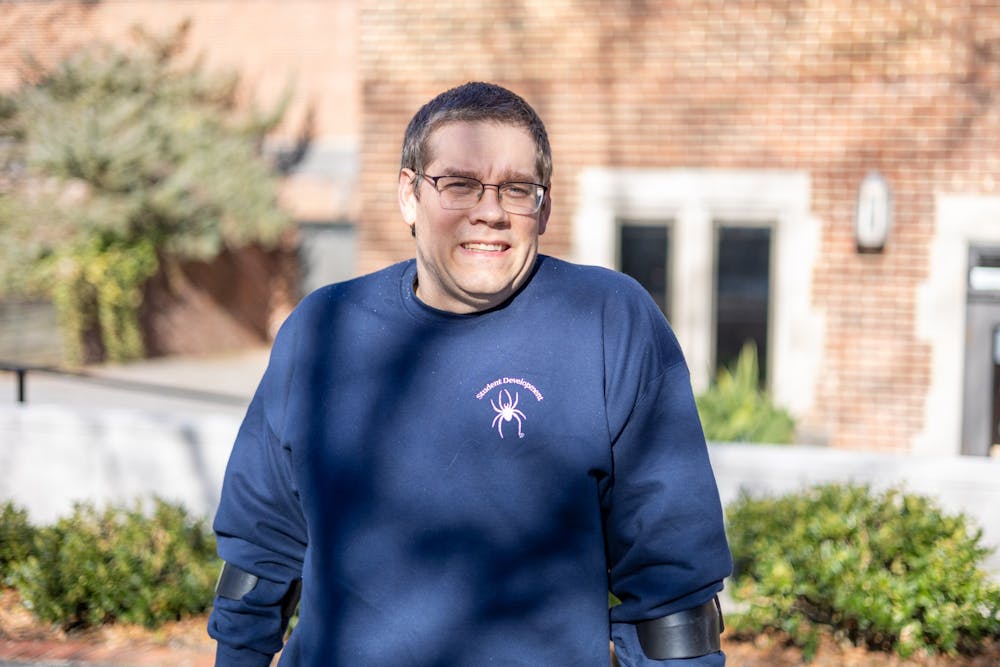Cort Schneider shared that he worries his daughter won’t believe in Santa Claus next year, that he once turned down a job in sports broadcasting and that buildings in North Dakota sometimes have doors six feet above ground in case of large snowdrifts.
This openness tends to be one of the first things that people mention about Schneider, the director of disability services at the University of Richmond.
“Where do I start? I mean, he is just extremely friendly,” Julia Kelly, disability services accessibility specialist, said. “We get so excited when students pop in, and that is a culture change that Dr. Schneider has implemented.”
Kelly and Schneider are the only full-time members of the UR disability services office.
Disability Student Ambassadors co-president Reese Silberman agreed, listing Schneider’s personability as one of his greatest impacts on the disability services office so far.
“I think he’s creating a more personalized experience,” Silberman said. “He tries to get to know each and every student.”
Since Schneider took on the role of disability services director last May, he has made consistent efforts to improve the relationship between students and the disability services office, beginning with availability, Silberman said.
“He tries to make it to every [disability student ambassadors] meeting,” Silberman said. “Even in the summer, before we started, he was talking to us and saying, ‘how much do you want me to be involved?’”
Schneider, who was born with cerebral palsy, says that his drive to mentor students with disabilities and facilitate disability education stems from his complicated history with his own disability.
For most of his life Schneider said he “hated” his disability. He described it as internalized oppression, which he describes as feelings of negative self-perception as a result of negative social stigma that is associated with an aspect of a person’s identity.
Schneider said that his perspective changed in graduate school when he read The Prison Notebooks, which explores the reasons why societally pervasive beliefs are difficult to change and how that often prevents social change.
“He’s talking about people rising up against people that oppress them, right?” Schneider said about author, Antonio Gramsci. “He’s trying to answer that question: Why don’t people who should revolt, revolt?”
Enjoy what you're reading?
Signup for our newsletter
After he connected the book to his own life, he had a “spiritual awakening” about his disability, he said, and realized that he had believed negative stigma about disability for years without resistance.
After his realization, he pursued a doctorate in cultural studies in education to educate people about disability and advocate for young people with disabilities. His goal was to create spaces where students with disabilities could be “as disabled as they needed to be” and feel empowered to be the best version of themselves, Schneider said.
At UR, Schneider has endeavored to create a space by changing the process students go through to get academic or physical accommodations for a disability.
“What Dr. Schneider believes in, and the change that he has implemented in our office, is that the primary documentation for students is their own narrative,” Kelly said. She added that although documentation from health providers is very important, a student’s statement on the specific obstacles that they face is also a critical element of a student’s application for accommodations.
This idea of student agency is also the subject of his upcoming book, which will be his third. He says that the book will focus on ways that disability services professionals and educators can give students the tools to advocate for themselves.
“It’s about giving them what I call powerful literacy or understanding of their disabilities,” Schneider said. “They’ll forget who I am twenty years from now, but they’ll have those skills to be able to advocate for themselves.”
For now, work on the book is on hiatus while Schneider balances his work as director of disability services with teaching two graduate classes on special education. He says that his hectic schedule doesn’t bother him, as he feels fulfilled by his work at the university.
“This work—that’s really not the word, you know? The word ‘vocation’ comes from vocatio, a call. When I say I’m called by this work, or that it calls to me, it’s not a job. It’s a vocation. This is what I’m meant to do,” Schneider said.
Contact features editor Kelsey McCabe at kelsey.mccabe@richmond.edu.
Support independent student media
You can make a tax-deductible donation by clicking the button below, which takes you to our secure PayPal account. The page is set up to receive contributions in whatever amount you designate. We look forward to using the money we raise to further our mission of providing honest and accurate information to students, faculty, staff, alumni and others in the general public.
Donate Now



